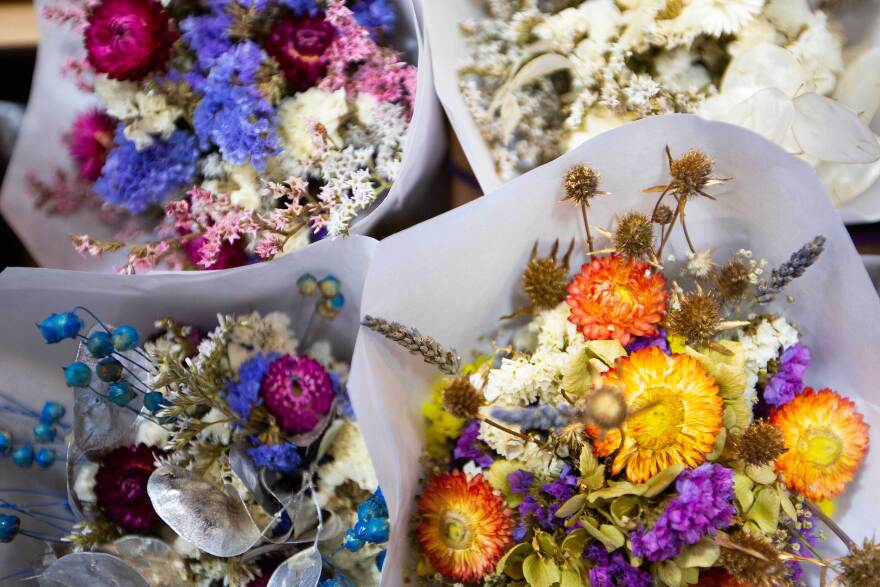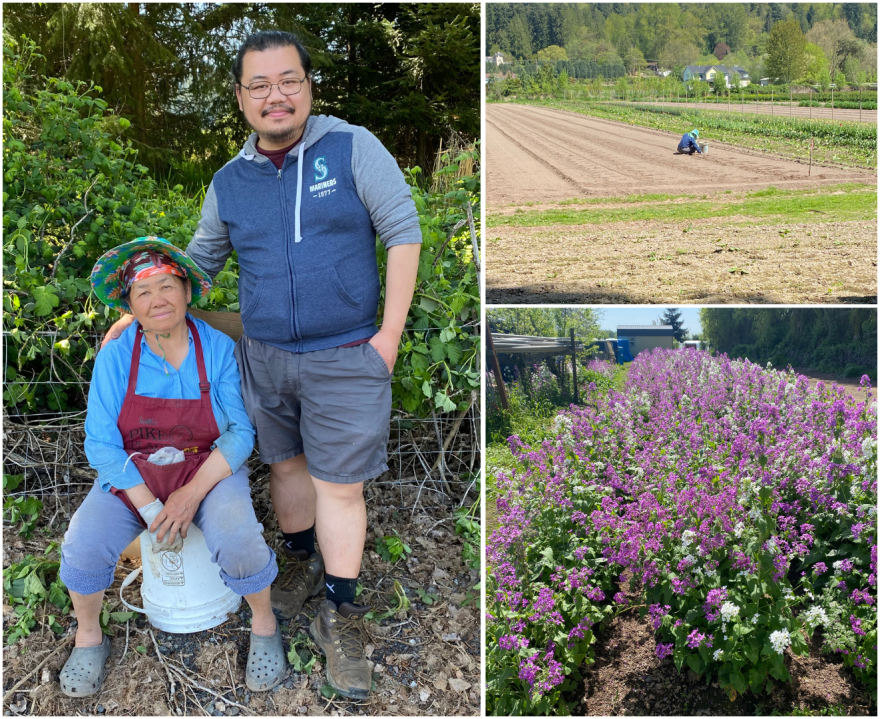It doesn’t look as beautiful as I thought it would as I step onto the flower farm.
It’s not like, say, the spring Tulip Festival in Skagit Valley where there are just rows and rows of flowers as far as the eye can see.

The beauty of See Lee Farm is more subtle. Scott Chang, who helps run the farm and sells the flowers he grows there at Pike Place Market, said he gets that a lot.
“We have a lot of people asking us, 'Hey, can we come visit your farm?' Like, well, it's not as pretty because it is a working farm, so you'll see a little bit of blooms, but we're going to be harvesting them as they come up," Chang said.
It’s a warm spring day, but Scott has his Seattle Mariners hoodie on. His dark hair is pulled back. He was born into this flower business. His mom, Chue, kept him by her side whether she was working at the farm, or at the market.
“So I have my little son, one-years old, I said, 'Oh I better take him to the farm, as I don't need to pay for a babysitter, because I had no money," Chue said.
His parents are Hmong refugees. They were forced to flee Laos because of the Vietnam War. But unlike his parents and brother, Scott was born here in the U.S.
Scott's mom, Chue, is small but looks strong. Covered in a big, flowery hat, it’s obvious she’s spent a lot of the time under the sun.
Chue worked as a fish cleaner and seamstress before returning to the trade she and many other Hmong refugees were already familiar with — farming. With the help of a co-op set up in the ‘80s for Hmong and Mien refugee farmers called the Indochinese Farm Project, Chue was able to grow food on county-owned land before focusing on flowers.
Scott said when he was little he would eat the strawberries they grew on the farm until he made himself sick and ride the tractor with dad.
"They used to have a little tiller that you could use, just kind of like a hand tiller, that we used to push and get rid of all the weeds. So Dad built me a wooden one that looked just exactly the same, didn't have anything on it, but I could just push along side with him," he said.

I asked Chue if after all these years she still enjoys farming.
"Too many people my age, they don't work, they don't do nothing. They stay home. Stay home. Some of them already passed away so that’s no good. So I had to push myself very hard. I don't make much money. But I be happy and then more stronger and living for longer,“ she said.
As we walked around the farm, we spotted Scott’s dad out in the field tending to the tulips they have growing. At this time of year, the family spends more time out here in Woodinville, 20 miles northeast of Seattle, than their home in Burien, south of Seattle.
"Growing up, you kind of, like, resent it because, you know, you're stuck at the farm, you start working every day. But, you know, you really see how hard your parents work after a while, and then you kind of respect that," Scott said.
"It's just you take it for granted when you're a kid, but as you get older, it's like, 'OK, wow, they're providing. Like for however many people, like six, seven other people with no education.'”
That hard work has continued to today.
"So in the summertime, the average day is, you know, you wake up, you go to Pike Place, sell until about 6:00. From then you come to the farm, harvest whatever you need for the next day, load it up, go home, dinner, sleep, and then wake up again. Do the whole thing over,” Scott said.
It's work his neighbor, named Xee, can relate to. We walked over to greet her.

"Well my mom and his mom grew up on the same mountain in Laos," Xee explained.
Xee and her parents are planting statice, a plant with small clusters of flowers used in fresh or dried bouquets, as they talk to us.
"And then we came here. It’s fortunate we just kinda ended up together. I think your parents were in the same refugee camp as my parents and our family," Xee told Scott.
"I wasn’t born yet though," Scott responded.
"I know you missed out on all that," Xee said.
Scott and Xee talked about the busiest days of the year. People buy flowers for graduations. Memorial Day is hectic. But it’s Mother’s Day when all chaos breaks out.
“It doesn't matter where you are in the world, Mother's Day, you have to come back and you have to help sell flowers with mom," Scott said.

"If you’re a dutiful son or dutiful daughter you must come help Mother’s Day, “ Xee explained.
“You could be a doctor anywhere. You could be like an astronaut. You have to come back. Or on this day or this weekend anyways, right? Let's say it's the unofficial Hmong New Year of Seattle,” Scott said.
Still, Scott said a lot of Seattleites don’t need much of a reason to buy flowers, in part because they’re relatively inexpensive.
"You know, tourists will come through, and they’re like, 'Why is everybody in Seattle walking around with flowers?' I'm like, 'Well, it's cheap, and it's a Tuesday.' You don't need an excuse to buy flowers. Just any day can be, you know, perfect," Scott said.
The flower farmers at Pike Place Market are able to keep prices low by keeping the middleman out. It also doesn’t cost much to rent a stall at the market – about $13 dollars per day for families who, like Scott's, have been at this for decades.
But the pandemic did impact the flower business. Scott turned to delivering flowers to customers himself, driving door to door. And instead of making the commute to the market, which like a lot of businesses closed temporarily, growers just started selling at local farmer markets instead.

"And they realized they actually had less competition there. And also it was a closer drive. It was probably like 10 minutes down the road," Scott said.
Xee thinks the market will continue to have to invent new ways of getting flowers into peoples’ hands. She’s already set up an online shop for dry flower bouquets put together from flowers grown on her farm.
"So I think we'll have to find some different solutions for Pike Place Market. Like, you know, maybe a drive thru flower spot or, you know, preorder and then pick up," she said.
Scott is confident the market will adapt. After all, he still remembers a time when locals bought the bulk of their groceries there. Now it’s mostly tourism.
"The market will evolve and change over time," he said.
I asked Scott about his future: "So if she were to retire, do you or your brother feel confident that you would know how to, like, manage everything?"
"I mean, to be honest, she's been retired for 10 years. And she's still here every day. So I always say Mom's going to outlive all of us. "
KNKX Connects is an ongoing series showcasing the people and places of our diverse and vibrant region. Your support helps KNKX connect listeners throughout Western Washington, presenting a much deeper look at the place we call home. Donate to this vital community service today.








